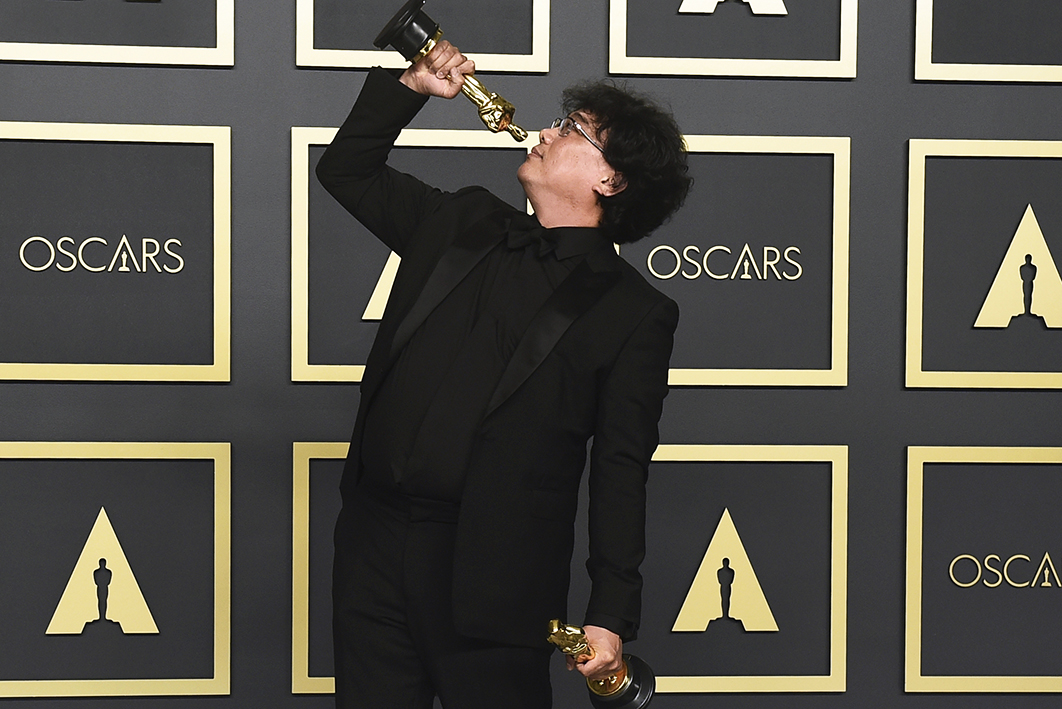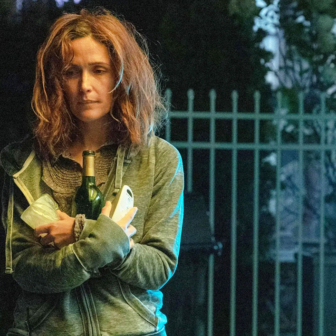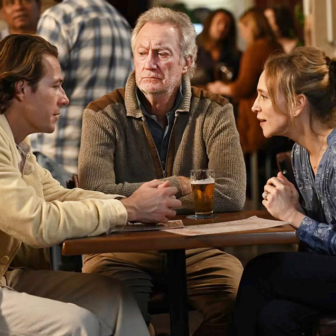In the week since the Oscars the internet has been streaming with stories about Parasite and director Bong Joon-ho. There’s even a clip doing the rounds showing how to cook Jjapaguri, the beef noodles in black sauce mentioned in the film. It’s a long time since an Academy Award for best picture has so delighted film fans. It seems a good time to tell my story.
Twenty-five years ago, a young filmmaker with a merry face and disorganised hair came into the Sydney studios of ABC Radio National. Bong Joon-ho was in town because a short film he’d made was screening in an Asia-Pacific Film festival here.
I didn’t broadcast the interview: it was tough going. I knew little, back then, about Korean cinema, and the festival organisers, and perhaps Bong, had vastly overestimated his ability to speak English. There is a huge difference between conversational English and the capacity to express more complex ideas in a language not your own.
But I admired his chutzpah, and his persistence. And perhaps we both learned from the attempt. Thereafter, I tried never to put filmmakers from other cultures at such a disadvantage, and became rather obsessed about finding good interpreters who were also good broadcasters and understood cinema. It’s harder than you may think. Perhaps Bong also learned from the experience: even now, he has a film-literate interpreter at his side for key public appearances.
Some years later, I saw his first feature, a satire called Barking Dogs Never Bite, at a European film festival. Afterwards, I strolled along the foreshore trailing two colleagues, both very distinguished European critics. “And what,” one enquired of the other, “are we to make of this silly little film?”
A few months later, at a different film festival in Asia, this silly little film won a critics’ award. And one of those colleagues, I was startled to see, was on the jury. Context, I think, helps a lot.
Many qualities make Bong Joon-ho a fine filmmaker. He is a perceptive observer of large-scale and small-scale human interaction. He has a belief in social justice — a moral sense, if you like. He doesn’t do cardboard cut-out heroes and villains: his characters have foibles, vanities and weaknesses; they may do bad things but they are not bad people.
Parasite’s Kim family, infiltrating the household of the wealthy Parks, are doing what they can to get by. It’s impossible to distrust the broad, dependable face of the father, Kim Ki-taek, played by the wonderful Song Kang-ho, who has enriched Bong Joon-ho’s films since he first played the self-deluding detective in Memories of Murder. The director may have his fun with the naive mother’s pride in the wealthy Park family, and with how her six-year-old plays off his parents, but these are all people we recognise, and each has their moment.
Bong’s pungent sense of humour has been evident since his short-film days. It’s based partly on his observations of human failings but also on his fondness for certain cinema traditions. He has a weakness for slapstick, and almost every film he makes features a chase sequence. Often a comic one.
In his third film — the wildly funny monster movie The Host, based on newspaper accounts that chemical waste in Seoul’s Han River had produced deformed fish — a monster fish makes off with a little girl. Bong’s protagonists are a hapless family operating a snack bar on the riverbank, but his satire neatly skewers the bureaucratic and military response to the crisis.
Those slapstick chase sequences have been there from the get-go. In an early short, Incoherence, we see an affluent jogger, pristine in a white tracksuit, stealing milk from doorsteps to refresh himself en route. A newspaper deliveryman gives chase, and it doesn’t end well. Even in the much tenser Memories of Murder, about a serial killer and two not very wily cops, there’s a moment when the pair hear a particular song on the radio and suddenly start running.
Among cinema’s hugely important elements is the arrangement — and movement — of bodies in space. Bong Joon-ho gets this. We see it early in Parasite, in a tableau of the impoverished Kim family in their scungy basement flat, scrambling into some kind of human pyramid to free ride on nearby wi-fi. When the same family manages to insert itself into the Parks’ luxurious house we see them spread out drunk while their employers are away. This scene is pretty well shot at floor level, in the style of Japanese directors like Yasujirō Ozu, but Ozu never imagined a family so louche.
Bong knows how to move his actors and can confidently choreograph complex scenes like the mayhem of the child’s birthday in Parasite. Just as importantly, he knows how to create on-screen spaces. The luxurious modern house in Parasite is such a great piece of contemporary architecture — it was receiving plaudits in architecture journals before some twigged it was a set — that I wanted to move into it myself.
It is a very particular set, built to convey both openness and secrets. An eavesdropper can hide on the stairs or behind a sliding door, and secrets can hide in the basement. There are two picture windows in Parasite: the one in the Parks’ luxurious mansion that frames a carefully manicured garden, and the one in the Kims’ grungy basement flat that looks out on an alley and a dumpster against which drunks regularly piss. There’s metaphor here of class difference and its prospects.
So far, Bong has leapt from genre to genre: social comedy (Barking Dogs), dystopia (Snowpiercer, Okje), policier (Memories of Murder) and monster movie (The Host). At his best, he can twist from comedy to drama in a blink.
I was not a complete fan of the director’s two American-backed movies, in each of which he was experimenting, I think, with budget and scale opportunities not afforded in Korea. Snowpiercer, adapted from a French graphic novel, had much to say about class, but the film was overwhelmed by its production design. And Okje, about capitalist exploitation of animals for profit, was let down by the giant pig. Its digital creators didn’t provide body language expressive enough to endear us to this member of a very intelligent species.
After last week’s award, Bong Joon-ho reflected on the fact that a film set very specifically in his own culture had proved more universally popular than those designed for a global audience. It’s salutary. A good story, convincingly set in a place and a time, can cross national boundaries to speak to us all. •




